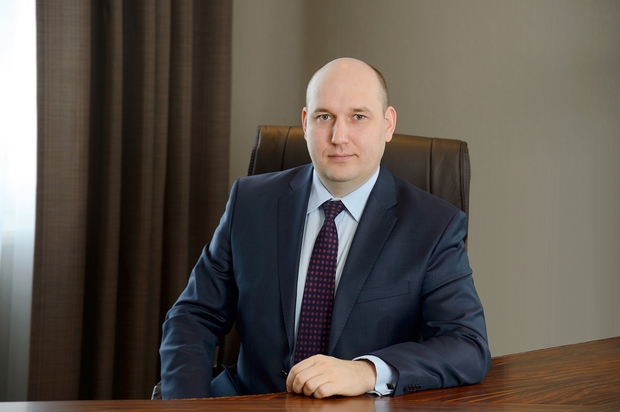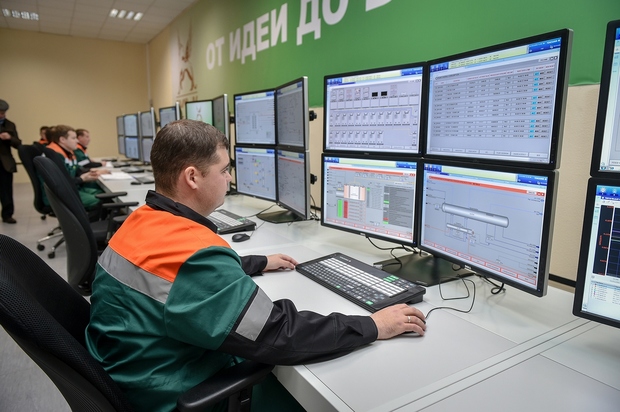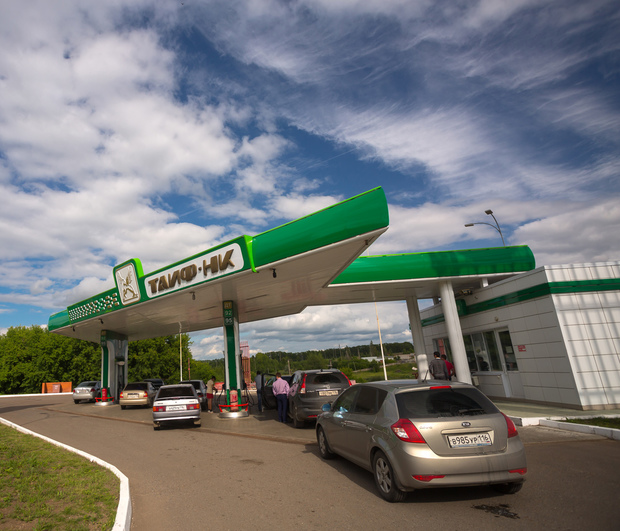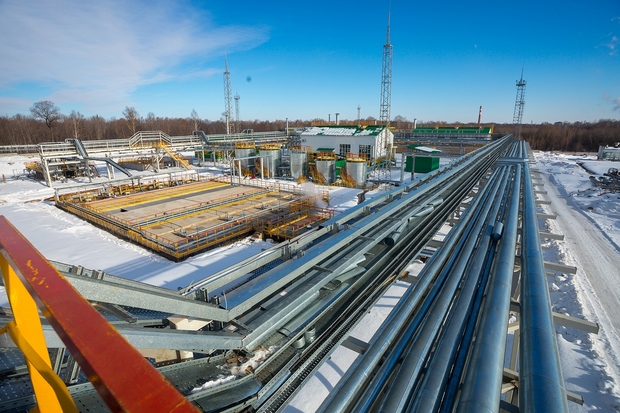Rushan Shamgunov, TAIF-NK: ‘The results in 2015 reflect all tenseness of the situation on the market’
In 2015, the record of 8.44 million tonnes of oil and gas condensate have been processed, the highest pace of the construction of the unique object — the Heavy Residues Deep Conversion Complex, the increase of incomes by 8%, and of assets — by 57%, despite the difficult economic and geopolitical situation. TAIF-NK once again demonstrates the high level and high performance. The Director General of the company Rushan Shamgunov told about the results of TAIF-NK JSC activity in 2015 in an interview with Realnoe Vremya.
Rushan Rashitovich, traditionally in April the joint stock companies present to their shareholders a report on the financial and economic activities over the past year. How was 2015 for the leading refinery company of the industry — TAIF-NK JSC?
First, I should note that the past year was not simple for our company, however, as well as for the whole oil refining industry. The refining, perhaps, like no other economic sector, fully felt the deterioration of the situation on the market of oil and oil products. The decline in world oil prices was followed by a sharp, more dramatic than for oil, drop in prices for petroleum products. All this was accompanied by a sharp weakening of the national currency. Of course, this has affected the financial results of our company.
However, despite this, we have managed to accomplish the year. In 2015, our productions have processed the record volumes of oil and gas raw materials – it is almost 8.5 million tonnes, which allowed partially offsetting the impact of negative factors. The results, which we had by the end of the year, reflect all tenseness of the market situation, the complexity of the work done by us in 2015, and demonstrate the company's ability to solve effectively some very difficult tasks.
In comparison with the data of 2014, the revenue has increased significantly, and what is the main result of the company?
In 2015, our company produced 8.2 million tonnes of marketable products at 143 billion rubles. I must note that this is the best result of the company over all years. The index of the industrial production amounted to 100.1%, which in the period of general decline in the economy had the positive impact on the activities of our company.
In the base of financial indicators of the activities of TAIF-NK in 2015, in the first place, there are macroeconomic changes. We have significantly increased the volume of processed raw materials, carried out the modernization and reconstruction of existing facilities. The whole 2015 year went smoothly, without any incidents. But our final financial figures have been negatively influenced, first of all, by the situation on the world market of oil and oil products, the devaluation of the ruble and the continuation of economic sanctions.

The company's revenues in comparison with the previous year have increased by 11 billion rubles. First of all, this is the result of the constant modernization of productions and the optimization of technological processes, which allowed increasing the production of high-quality white products.
At the same time, the so-called 'big tax maneuver' entered into force on 1 January 2015, unfortunately, have stimulated interest in the oil export. Taking into account the devaluation of the ruble, the cost of raw materials in the domestic market in the ruble equivalent has increased significantly.
In may seem paradoxical, but with the fall in world prices two (!) times the prices on oil and gas raw materials in Russia not only have not decreased but even increased. As a result, this has led to additional costs at the amount of 19 billion rubles.
TAIF-NK does not have its own raw materials, is not included in vertically integrated structures and today practically the only company processing the purchased oil, so respectively, is forced to agree to the proposed price terms in order to provide its activities with raw materials.
Thus, the increase in costs for raw materials in 2015 started to outpace significantly the growth of revenue from the sale of petroleum products. Of course, this has led to enormous loss of profitability of TAIF-NK.
Annually increasing tariffs for transportation by pipeline and railway transport also have not contributed to the financial growth of the company. In comparison with 2014, the growth of tariffs has increased the company's costs by 2 billion rubles. It is an additional cost, which the company has also failed to compensate by its income.

Another factor that has had a significant impact on the financial results of our company last year, — it is a dramatic fall in price of the national currency. This has led to the additional costs due to the forced reassessment of the cost of attracted credit resources for the construction of our strategic project — the Heavy Residues Deep Conversion Complex. And, of course, the service of loan attracted for the implementation of this investment project, led to the increase of interest expense by 1.5 billion rubles in 2015.
In such challenging, even difficult conditions, which caused a huge additional financial burden, the company had the net profit at the end of 2015.
What share in the structure of revenues of the company is accounted for export? What is the sales policy of TAIF-NK based on?
In the segment of quality of our products we have achieved high standards, which, in its turn, have increased the demand for it on the domestic market — and we are the raw materials for petrochemical enterprises of Tatarstan, as well as for foreign consumers.
The geographical location of the company determines target markets and sales policy of the company — it is mainly the markets of the Volga Federal District and the Republic of Tatarstan, for export sales — the markets in North-Western Europe, Mediterranean and the CIS countries, where last year it was delivered more than 5 million tonnes of oil products. It is more than half of the total volume of products of TAIF-NK sold in 2015.

However, despite the weightiness of export direction, the company is actively expanding its sales channels as close as possible to the final consumer — the expansion of its retail network of filling stations. By the end of 2015, 45 filling stations worked under the brand name of TAIF-NK. The basis of the sales policy of the company, of course, is the quality of our oil products and the company's reputation as a reliable supplier.
In addition to the main activities, in 2015 TAIF-NK continued the implementation of the largest investment project, which has already become a landmark in the history of the development of oil refining. At what stage is the project today, whether has the crisis affected the pace of construction and installation works and whether has the programme of development of the company been adjusted in light of the unstable economic situation in the country and the world?
I should note that, despite the overall decline in investment activity in the sector, when the investment volume dropped from 290 billion rubles in 2014 to 214 billion rubles in 2015 and the majority of investment projects in oil refining was suspended, TAIF-NK continued its ambitious programme of development. The company's investments in 2015 amounted to 40 billion rubles.
So, in November of 2015, we launched the industrial production of diesel fuel of the ecological standard Euro-5, eight months before the deadline set by the technical regulations of the Russian government 'On requirements to automobile and aviation gasoline, diesel and marine fuels for jet engines and heating oil'. The President of the Republic Rustam Minnikhanov, who took part in the ceremony of the start diesel fuel production of Euro 5 standard, marked the high environmental value of these products.
Our other major project, almost completed in 2015, — it is a large-scale reconstruction of the work of local industrial wastewater treatment. The special status of the project is due not only its economic component but also the social orientation. The main goal is the creation of a closed water cycle, in which the degree of filtration will amount to 99.99%, which will allow to re-use water in industrial processes and completely eliminate the water withdrawal from the Kama river. Due to the use of modern technologies for the treatment of industrial wastewater, the water consumption of the enterprise will be reduced more than half.

We have made a significant progress in the construction project of a new modern production — the Heavy Residues Deep Conversion Complex. Our main forces have been concentrated mainly on this project. By the end of 2015, 95% of metal structures have been manufactured and installed, the installation of technological equipment has been fulfilled at 94%, of process pipelines – 57%.
In general, the readiness of the project was more than 60%, and this despite the fact that the construction and installation works at the site began only two years ago. The implementation of this project will allow TAIF-NK to reach a new level of quality in the processing of crude oil: the production will become virtually waste-free, and the oil processing depth will reach 98.5%.

It should be noted that, unfortunately, this project does not solve the problem of processing of oil of deteriorating quality. TAIF-NK is forced to continue to refine heavy sour crude oil on its capacities, while high-gravity oil, extracted in the country, is exported to foreign countries. It is a question not only of economic efficiency but also a question of security and reliability of the equipment subjected to more corrosive wear.
In your speech at the meeting with participation of RT President held in Nizhnekamsk in November of 2015, you noted that projects such as the HRDCC require government support, especially in such difficult economic situation. What steps have been taken in this direction and what results have been achieved?
Yes, we have repeatedly stated and tried to draw the attention of the government of the Republic on the issue of the necessity of the state support measures, particularly when the companies implement significant investment projects in these challenging times. The most urgent, of course, are the issues of the necessity of processing of high-gravity oil within the country's, the regulation of tariffs for transportation of oil products, development of transport and social infrastructure.
To solve these issues, we now actively work with the Republican Ministries in charge of these issues, as well with federal ones. However, final decisions have not been taken yet. Besides, at the regional level, the urgent issue due to the planned by the end of 2016 completion of construction of the Heavy Residues Deep Conversion Complex is the provision of tax preferences on property. In the framework of the existing decree of the Cabinet of Ministers № 284 at the end of 2015, we have sent the appropriate applications and materials. We have already received a positive conclusion of the Ministry of Industry and Trade, the Ministry of Economy and we expect that in the near future we will receive the final conclusion of the Ministry of Finance of the Republic of Tatarstan. The funds that we have accumulated in the framework of this benefit, will at least partially reduce the increased financial burden on the company, which, of course, will return to the Republic in the form of growth of industrial production, the growth of incomes and tax payments.
TAIF-NK is known in Nizhnekamsk, as well as in the Republic with various socially-oriented and charitable programmes. Did the company continue their implementation last year or the economic situation has adjusted the work in this direction?
Social responsibility remains one of the priorities of the activities of TAIF-NK. Social programmes of the company are aimed at environmental protection, industrial safety, health and welfare of employees, their social security, the support of people with disabilities, support for the poor, aid to veterans of the Great Patriotic War.
We traditionally, despite all the economic difficulties, are involved in the financing of socially significant regional programmes of support of healthcare, education and the revival of cultural and spiritual-historical heritage. Besides, we support the sport, and for many years we are the general sponsor of football club Rubin, one of the leading Russian football clubs. The participation in the project of the Volga Federal District Kadetstvo is our company's contribution to the intellectual, cultural, physical and moral development of the younger generation.
The company actively supports the projects of the first President of the Republic Mintimer Shaimiev for the preservation and revival of historical monuments — the national heritage of the Republic of Tatarstan. For the participation in the project 'Cultural heritage of Tatarstan: ancient town of Bolgar and island-town of Sviyazhsk' in 2015 TAIF-NK was listed in VI volume of the Book of benefactors.
We must say about the implementation of the approved mortgage programme of the company, which, of course, had not been implemented without the support of our shareholder. Due to this programme, the employees of the company, for many years awaiting the solution of their housing problem, will have the opportunity to move to long-awaited apartments. In 2015, our workers moved in the houses built under this programme.
About 6 billion rubles have been allocated for the realization of all the goals that I have outlined, which is proportional to the net profit earned by TAIF-NK in 2015.